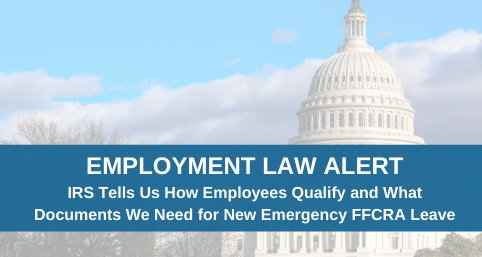
The new FFCRA leave law is coming a little more into focus (despite being already in effect). Late last week, the Internal Revenue Service (IRS) clarified that only one caregiver may take advantage of the emergency paid sick or FMLA leave available under the recently enacted Families First Coronavirus Response Act (FFCRA) to care for a child whose school or childcare is closed. Where the child in question is over age 14, the employee requesting leave is also required to detail the special circumstances that necessitate the parent to provide care.
Employees seeking to use emergency sick or medical leave under the FFCRA must provide their employer with a written leave request containing the following information:
When the request is based on a quarantine order or self-quarantine advice: the employee’s statement should also include the name of the governmental entity ordering quarantine or the name of the health care professional advising self-quarantine. Additionally, if the person subject to quarantine or advised to self-quarantine is someone other than the employee, the employee must also provide that person’s name and relationship to the employee.
Where the request is based on a school closing or the unavailability of child care: the employee’s statement should also include—
Where the inability to work or telework is due to the need to provide care for a child older than 14 during daylight hours, the employee must also provide a statement as to the existence of special circumstances requiring the employee to provide such care.
The most significant takeaways from this new guidance are
More information regarding these requirements is provided by the IRS in the answers to Basic FAQs found here.
Shulman Rogers will be providing additional information regarding documentation employers are required to retain in order to obtain a tax credit under the FFCRA in a forthcoming alert.
Shulman Rogers attorneys are
available to answer any questions related to documenting use of emergency sick
and FMLA leave under the FFCRA.
The contents of this Alert are for informational purposes only and do not constitute legal advice. If you have any questions about this Alert, please contact the Shulman Rogers attorney with whom you regularly work or a member of the Shulman Rogers Employment and Labor Law Group.
Stay up to date with all the latest news and events.